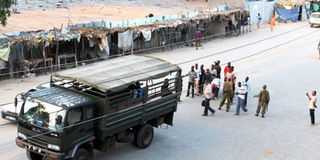Concern over rape cases in Wajir

A patrol on a street in Garissa town on April 25, 2013. Robai Mohamed was attacked as she came home from school in the border town of Garissa near Somalia. PHOTO | STEPHEN MUDIARI | FILE
What you need to know:
- Over 98 percent of attempted and actual rape and defilement cases go unreported in Wajir
- According to activists, most of the rape cases go unreported due to a number of reasons
Robai Mohamed's six-year-old rake-thin frame, neatly draped in a blue buibui, trembles visibly as she relives a nightmare - yet again, because it haunts her dreams.
That afternoon she was raped by her 25-year-old neighbour as she came home from school in the border town of Garissa near Somalia. She now wakes up every night screaming her assailant's name and shouting how she will stone him if they cross paths again.
Unknown to her, they may never cross paths again as her assailant was quickly ferried to Nairobi by his family and her illiterate father was coaxed into not pressing charges and instead accepting eight sheep as maslah (a traditional way of settling dispute in the Somali community).
Robai's case is one among many others in Wajir County a place women activists claim has one of the highest cases of rapes and defilement. "It's not a minority issue. It's a community issue," said Fatuma Yusuf, the chairlady of Wajir-based Arid Area Paralegal Network, an NGO which advocates the rights of girls and women.
UNREPORTED CASES
Local elders and leaders are accused of discouraging anyone from reporting cases such as Robai's, which was followed by three other rape cases in the same neighbourhood. By settling them traditionally via payment, the community leaders use intimidation to make the families of the victims accept the maslah of which they take the lion's share.
According to a recently released police report on sexual offenses in Wajir County, only five women and three girls have been victims of rape this year, a figure Fatuma said does not reflect the situation on the ground. Over 98 percent of attempted and actual rape and defilement cases go unreported in Wajir because of the interventions, Fatuma said.
According to activists, most of the rape cases go unreported due to a number of reasons, among them "caste" hierarchy, the shame of losing one's virginity before marriage, trauma, self-denial, suicide or even death. Fatuma called for a government crackdown on administrators who are spearheading the settlement of defilement and rape cases by maslah.
This is a view echoed by Wajir County Commissioner Naftali Mung'athia, who told Xinhua that any local government official found to be colluding with village elders to stop such cases from being reported will be sacked or prosecuted.
"As the government, we have clearly spelt out that there are some crimes like rape, defilement, murder and robbery with violence which cannot be settled under maslah and the law has to take its course," Mung'athia said.





